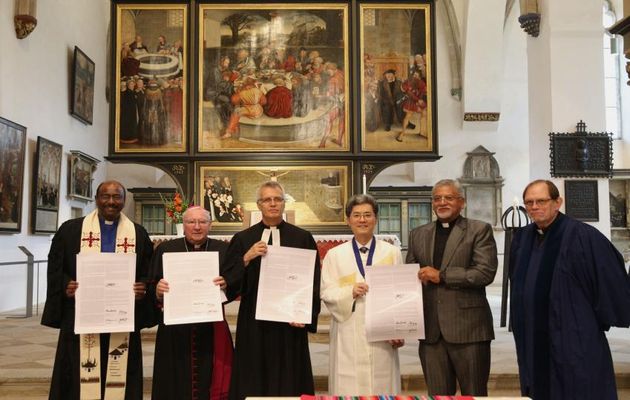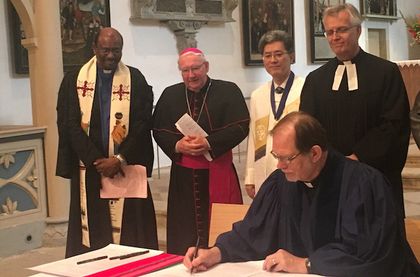In Wittenberg, the WCRC signed the Joint Declaration on the Doctrine of Justification (1999).
 The signers of the JDDJ, in Wittenberg. / WCRC
The signers of the JDDJ, in Wittenberg. / WCRC
The World Communion of Reformed Churches (WCRC) has signed the Joint Declaration on the Doctrine of Justification (JDDJ).
The signature happened during an ecumenical prayer service, in the context of the WCRC’s General Council, taking place from June 29 to July 7. The ceremony was held in the German town of Wittenberg, where Martin Luther nailed his 95 thesis.
Now the doctrinal agreement is supported by the Roman Catholic Church, the Lutheran World Federation (LWF), the World Methodist Council (WMC), and the WCRC.
FARRELL: “WE HAVE A COMMON UNDERSTANDING”
Bishop Brian Farrell, Roman Catholic Secretary of the Pontifical Council for Promoting Christian Unity, expressed his satisfaction with the agreement.
He recalled that “one of the major problems of 16th century was the theological and spiritual understanding of how the salvation brought by Christ actually takes effect in the life of people.”
“But in the ecumenical process, we have come to see that we have a common understanding, that we are saved by grace, but that that requires that we show our changed relationship to God in good works”, Farrell said.
The Catholic representative believes that this oingoing process “allowed the signing of the Joint Declaration on Justification in 1999 along with the LWF; then, in 2006, the Methodist Church associated itself with this doctrine. And now all the Communion of the Reformed Churches does the same.”
“Catholics and most of the historical Protestant Churches now agree on the essence of justification, so we have a much stronger basis on which to build our spiritual and ecclesial relationship”, Farrell said.
“SPIRIT OF ECUMENICAL OPENNESS”
The WCRC and the LWF also signed the “Wittenberg Witness”, a common statement affirming their common call to continued renewal and cooperation on the occasion of the 500th anniversary of the Protestant Reformation.
“We approach the Reformation anniversary from the perspective of the unity of the body of Christ, which is a gift of God. This means we approach it with a spirit of ecumenical openness and accountability. The Wittenberg Witness is a testimony to this”, said LWF General Secretary Junge.
 The signing ceremony was held in Wittenberg. / WCRC
The signing ceremony was held in Wittenberg. / WCRCTHE WCRC
The World Communion of Reformed Churches (WCRC) is the largest association of Reformed Churches in the world and the fifth largest Christian communion in the world, after the Roman Catholic Church, the Eastern Orthodox Church, the Anglican Communion and the Methodist Council World.
It represents some 80 million Christians in Congregational, Presbyterian, Reformed, United, Uniting and Waldensian churches in 108 countries.
This Christian ecumenical body was formed in June 2010 by the union of the World Alliance of Reformed Churches (WARC) and the Reformed Ecumenical Council (REC).
EVANGELICALS ON JUSTIFICATION BY FAITH
The doctrine of justification is considered one of the pillars of the Protestant Reformation. British evangelical theologian Michael Reeves recently said during the 2017 European Leadership Forum that justification could be defined as “the verdict by which the sinner is declared righteous before God by faith in Christ.”
According to Reeves, Luther and the Reformers “rediscovered the glorious truth that sinners are justified by faith alone in Christ." The key to this doctrine, Reeves explained, is that "a sinner can rest in the perfect righteousness of Christ by trusting in him."
However, this is not the understanding that can be found in the JDDJ, he said.
Another evangelical theologian, Italian Leonardo de Chirico said in an article published by Evangelical Focus that Catholics and Lutherans “significantly converge in presenting an inflated view of man’s abilities to do something for one’s own salvation (whatever salvation means for them), a defective view of sin, a rejection of Christ’s substitutionary atonement, and an uneasiness towards everything related to God’s justice and judgment.”
“It is no surprise that in 1999 these Catholic and Protestant liberal accounts of justification merged together into the Joint Declaration on the Doctrine of Justification. They were already close enough to finally come to the point of drafting a joint statement”, Chirico writes.
Reeves, De Chirico and others have expressed their disagreement with the path towards ecumenical unity promoted by some of the Christian traditions.
This led to the beginning of the Reformanda initiative in 2016, which published a manifesto stating that the Reformation "is not over." The document has been signed by dozens of evangelical theologians and representatives from over fifteen countries.

Las opiniones vertidas por nuestros colaboradores se realizan a nivel personal, pudiendo coincidir o no con la postura de la dirección de Protestante Digital.
Si quieres comentar o